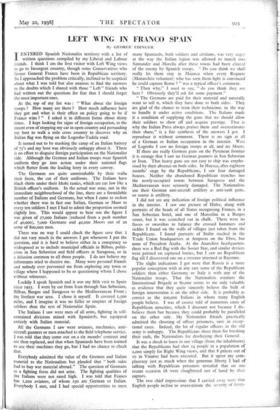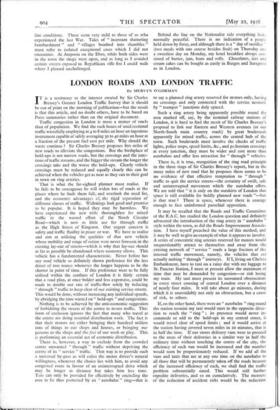LEFT WING IN FRANCO SPAIN
By GEORGE EDINGER
IENTERED Spanish Nationalist territory with a list of written questions compiled by my Liberal and Labour friends. I think I am the first visitor with Left Wing views to go to Insurgent country, though some Conservatives who favour General Franco have been in Republican territory. So I approached the problem critically, inclined to be sceptical about what I was told but also anxious to find the answers to the doubts which I shared with those " Left " friends who had written out the questions for fear that I should forget the most important ones.
At the, top of my list was : " What about the foreign troops ? How many are there ? How much influence have they got and what is their effect on policy going to be if Franco wins ? " I asked it in different forms about thirty times. I kept looking for signs of foreign occupation, to the extent even of stopping my car in open country and persuading my host to walk a mile cross country to discover why an Italian flag was flying on the Logrofio-Tudela road.
It turned out to be marking the camp of an Italian battery of 75's and my host was obviously unhappy about it. There is no effort to disguise foreign participation on the Nationalist side. Although the German and Italian troops wear Spanish uniform they go into action under their national flags which flutter from the leading lorry in every convoy.
The Germans are quite unmistakable by their wall their faces, the cut of their uniforms. The Italians have black shirts under their khaki tunics, which are cut low like a British officer's uniform. In the actual war zone, not in the immediate neighbourhood of the line, there are a formidable number of Italians and Germans, but when I came to reckon whether there was in fact one Italian, German or Moor to every ten soldiers I met I had to admit the proportion seemed slightly less. This would appear to bear out the figure I was given of 27,000 Italians (reduced from a peak number of 40,000), 7,000 Germans and 40,000 Moors out of an army of 800,000 men.
There was no way I could check the figure save that did not vary much in the answers I got whenever I put the question, and it is hard to believe either in a conspiracy so widespread as to include municipal officials in Bilbao, politi- cians in San Sebastian and field officers at Saragossa, or in a delusion common to all those people. I do not believe my informants tried to deceive me. Many were personal friends and nobody ever prevented me from exploring any town or village where I happened to be or questioning whom I chose without witnesses.
Luckily I speak Spanish and it was my fifth visit to Spain since 1925. I went by car from Irun through San Sebastian, Bilbao, Burgos and Saragossa to the Mediterranean Front ; the liveliest war area. I chose it myself. It covered 1,500 miles, and I imagine it was no fuller or emptier of foreign soldiers than the rest of Nationalist Spain.
The Italians I saw were men of all arms, fighting in self- contained divisions mixed with Spaniards, but equipped entirely with Italian material.
All the Germans I saw were aviators, mechanics, anti- aircraft gunners or men attached to the field telephone service. I was told that they come out on a six months' contract and are then replaced, and that when Spaniards have been trained to use their machines they go, but I had no chance to check that.
Everybody admitted the value of the German and Italian material to the Nationalists but pleaded that " both sides had to buy war material abroad." The question of Germans as a fighting force did not arise. The fighting qualities of the Italians were not rated high. I was told that Franco has 1,200 aviators, of whom 250 are .German or Italian. Everybody I met, and I had special opportunities to meet many Spaniards, both soldiers and civilians, was very angry at the way the Italian legion was allowed to march into Santander and Morella after these towns had been cleared of the enemy by Spanish troops. " Do you think we shall really let them stay in Majorca when every Requete (Monarchist volunteer) who has seen them fight is convinced he could capture Rome ? " was a typical officer's comment.
" Then why," I used to say, " do you think they are here ? Obviously they'll ask for some payment."
" The Germans are paid for their material and naturally want to sell it, which they have done to both sides. They are glad of the chance to train their technicians in the way to handle it under active conditions. The Italians made it a condition of supplying the guns that we should allow their soldiers to show off and acquire prestige. That is why the Italian Press always praises them and overestimates their share," is a fair synthesis of the answers I got. I reproduce it without comment. There is no sign at all of a German or Italian occupation in the interior. West of Logrofio I saw no foreign troops at all, and no Moors. If there are really German guns on the Pyrenean frontier it is strange that I saw no German gunners in San Sebastian or Irun. That heavy guns are not easy to ship was empha- sised by their absence on both sides. In Huesca, after eighteen months' siege by the Republicans, I saw four damaged houses. Neither the abandoned Republican trenches nor the newly-occupied towns between Saragossa and the Mediterranean were seriously damaged. The Nationalists use their German anti-aircraft artillery as anti-tank guns, so scarce is artillery.
I did not see any indication of foreign political influence in the interior. I saw one picture of Hitler, along with portraits of the heads of all States recognising Franco, in a San Sebastian hotel, and one of Mussolini in a Burgos street, but it was scratched out in chalk. There were no fasces or swastikas to balance the crossed hammers and sickles I found on the walls of villages just taken from the Republicans. I found portraits of Stalin stacked in the Trade Union headquarters at Amposta on the Ebro, but none of President Azafia. At the Anarchist headquarters there was a Red flag with the Soviet Star, and similar devices were painted on captured lorries, but I saw no Republican flag till I discovered one on a steamer interned at Bayonne.
The slight indications I got were that Russia is a more popular conception with at any rate some of the Republican soldiers than either Germany or Italy is with any of the Nationalist troops. That the Nationalists estimate the International Brigade at 8o,000 seems to me only valuable as evidence that they quite sincerely believe the bulk of foreign intervention is on the other side. It is probably as correct as the 200,000 Italians in whom many English people believe. I was of course told of numerous cases of Republican atrocities, which I discount not because I dis- believe them but because they could probably be paralleled on the other side. My Nationalist friends practically admitted the shooting of officer prisoners, save in excep- tional cases. Indeed, the lot of regular officers in the old army is unhappy. The Republicans shoot them for breaking their oath, the Nationalists for disobeying their General.
It was a shock to learn in one village (from the inhabitants) that the Republicans had shot 24 people in a population of 2,000 simply for Right Wing views, and that 8 priests out of to in Vinaroz had been executed. But it upset my com- placency just as much when the generous liberty I had of talking with Republican prisoners revealed that on one recent occasion 28 were slaughtered out of hand by their captors. The two chief impressions that I carried away were that English people incline to overestimate the severity of front- line conditions. These seem very mild to those of us who experienced the last War. Tales of " incessant shattering bombardment " and " villages bombed into shambles " must refer to isolated exceptional cases which I did not encounter. At Amposta on the Ebro, while both sides were in the town the shops were open, and as long as I avoided certain streets exposed to Republican rifle fire I could walk where I pleased unchallenged. Behind the line on the Nationalist side everything looks normally peaceful. There is no indication of a people held down by force, and although there is a " day of sacrifice " (two meals with one course besides fruit) on Thursday and a sweetless day on Monday, my hotel breakfast always con- sisted of butter, jam, buns and rolls. Chocolates, ices and cream cakes can be bought as easily in Burgos and Saragossa as in London.



















































 Previous page
Previous page